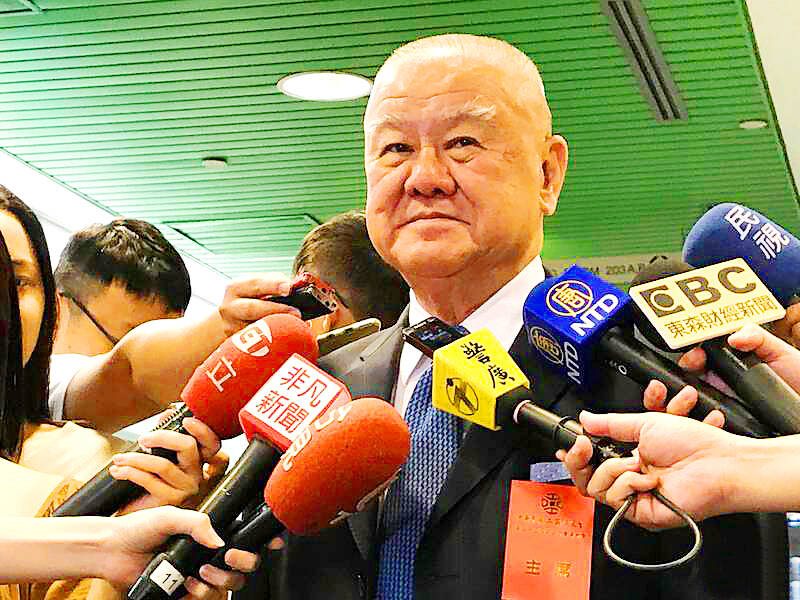Taiwan’s economy appears to have emerged from its most challenging phase and is expected to improve next year, trade group Third Wednesday Club (三 三會) said yesterday, as easing global trade tensions following recent US tariff adjustments begin to take effect.
The local business community generally believes “the worst period linked to US tariffs is over,” and firms have gained experience navigating US trade policies, tariff changes and global supply-chain restructuring, group chairman Lin Por-feng (林伯豐) said on the sidelines of a monthly gathering in Taipei.
Companies that are pursuing transformation, investing in new product development and innovation, and remaining committed to research would be better positioned to capture growth opportunities, Lin said.

Photo: Taipei Times file photo
Citing his own company, Taiwan Glass Industry Corp (台玻), Lin said the firm is developing products such as fiberglass cloth and flat glass, and future performance would show whether these transitions prove successful.
Strong global demand for artificial intelligence (AI) hardware benefits Taiwan’s exports of semiconductors, electronics and related products, and firms that recalibrate their business models to align production with sales are likely to see improved outlooks, he said.
However, Taiwan’s economic structure remains heavily concentrated in a few sectors, while private consumption and services have yet to fully return to pre-COVID-19 pandemic levels, he said.
Green energy development has also progressed slowly, driving up the costs of energy transition, while a rapidly aging population and labor shortages pose risks to long-term growth, he added.
To address these challenges, the trade group yesterday urged the government to promote smart tourism, digital, cultural and creative industries, and upgrade local service sectors.
It also called on the government to expand Taiwan’s talent pool in AI, semiconductors and sustainable industries, while easing regulations to attract high-level foreign professionals.
Policymakers should also seek to maintain price stability and adopt prudent monetary policies to guard against asset bubbles, it said.
Energy self-sufficiency is another key focus, the group said, urging the government to extend the lifespans of nuclear power plants after completing assessments.
The government should also accelerate renewable energy and energy storage development, and support companies in adopting environmentally friendly and carbon-reduction technologies, it said.

NEW IDENTITY: Known for its software, India has expanded into hardware, with its semiconductor industry growing from US$38bn in 2023 to US$45bn to US$50bn India on Saturday inaugurated its first semiconductor assembly and test facility, a milestone in the government’s push to reduce dependence on foreign chipmakers and stake a claim in a sector dominated by China. Indian Prime Minister Narendra Modi opened US firm Micron Technology Inc’s semiconductor assembly, test and packaging unit in his home state of Gujarat, hailing the “dawn of a new era” for India’s technology ambitions. “When young Indians look back in the future, they will see this decade as the turning point in our tech future,” Modi told the event, which was broadcast on his YouTube channel. The plant would convert

‘SEISMIC SHIFT’: The researcher forecast there would be about 1.1 billion mobile shipments this year, down from 1.26 billion the prior year and erasing years of gains The global smartphone market is expected to contract 12.9 percent this year due to the unprecedented memorychip shortage, marking “a crisis like no other,” researcher International Data Corp (IDC) said. The new forecast, a dramatic revision down from earlier estimates, gives the latest accounting of the ongoing memory crunch that is affecting every corner of the electronics industry. The demand for advanced memory to power artificial intelligence (AI) tasks has drained global supply until well into next year and jeopardizes the business model of many smartphone makers. IDC forecast about 1.1 billion mobile shipments this year, down from 1.26 billion the prior

People stand in a Pokemon store in Tokyo on Thursday. One of the world highest-grossing franchises is celebrated its 30th anniversary yesterday.

Zimbabwe’s ban on raw lithium exports is forcing Chinese miners to rethink their strategy, speeding up plans to process the metal locally instead of shipping it to China’s vast rechargeable battery industry. The country is Africa’s largest lithium producer and has one of the world’s largest reserves, according to the US Geological Survey (USGS). Zimbabwe already banned the export of lithium ore in 2022 and last year announced it would halt exports of lithium concentrates from January next year. However, on Wednesday it imposed the ban with immediate effect, leaving unclear what the lithium mining sector would do in the